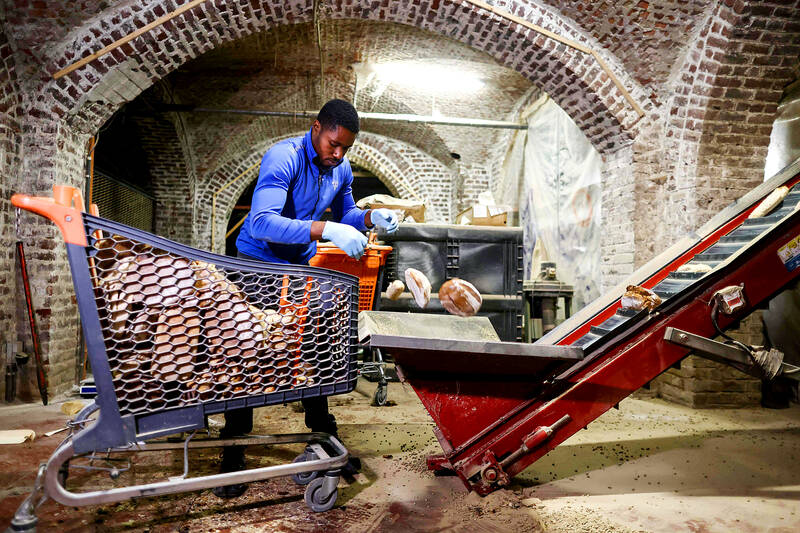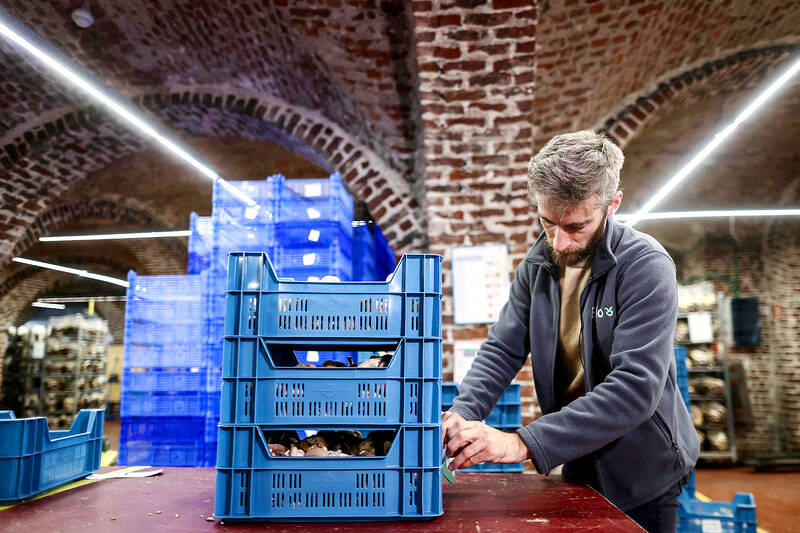In Belgium, a country reputed for its beer, mushrooms nourished on a byproduct from the brew are doing booming business.
The high-end fungi grown by Brussels firm Eclo in a disused abattoir are finding their way to gourmet customers — while boosting the circular economy.
The seven mushroom varieties produced by Eclo are mostly sought-after exotic types usually found in Asia, including shiitake, maitake and pom pom mushrooms.

Photo: AFP
They all fetch premium prices on the firm’s Web site, about 22 euros (US$21.40) for a 750g box, and the substrate — the substance the spores grow out of — is easy to come by in Belgium: a mix of spent grain left over from the mashing process to make beer, and discarded baguettes and dried bread.
“The beer and the bread don’t have any effect on the mushrooms’ taste, but we get better yields from them in terms of quantity and quality,” said Quentin Declerck, one of Eclo’s founders.
His company has for several years been collecting the brewers’ grain from Belgian beermaker Cantillon and leftover bread from Colruyt Group supermarkets and the Bon Pain chain of bakery and sandwich shops.

Photo: AFP
The collaboration enables Eclo to recycle 5 tonnes of brewers’ discarded grain and 18 tonnes of bread annually. That castoff material then goes into Eclo’s cold rooms, where the mushrooms grow in the moist air.
Each week, the company sells between 8 and 10 tonnes of its mushrooms.
Beyond the blooming financial advantage the activity brings, contributing to a domestically made and ecologically friendly production in Brussels is a motivation, Declerck said.
“We realized that many of the mushrooms bought in shops came from the Netherlands, many from eastern [European] countries, and even further afield, from China,” he said. “Today there is a certain production that has been relocalized [to Belgium]. We are part of that movement.”
Eclo was created in 2014 after its founders read a book about the circular economy, in which discarded items are repurposed and reintroduced into the market rather than thrown away. The book spoke of growing mushrooms from coffee grounds — a process already being used by another Brussels company.
Eclo tried that route initially, but “it was a resounding failure” for the varieties it wanted to grow, Declerck said.
“Shiitake doesn’t grow at all in coffee grounds,” he said.
So the company switched direction for its substrate, and trained about 30 people on how to grow mushrooms from brewers’ grain and bread.
The experience has had its ups and downs.
“Some of them just gave up. This is still a form of farming and it’s tough — you work in very moist rooms, sometimes you don’t see the sun all day,” Declerck said.
Trying to compete against industrial-scale rivals also dealt a blow to the morale of some.
“You need to cope with market prices otherwise you simply don’t sell. We’ve found our niche, so we’re able to pay our people fairly, but a lot of projects don’t pay,” Declerck said.
Eclo is testing out other options in its production, for instance seeing if substrate using discarded ground cacao beans. It is also seeking to grow and set up a factory that can sell substrates on the European market.
In Belgium, the number of companies involved in the circular economy grew by one-third between 2019 and last year, a study released this year by the Inoopa start-up found.
Yet there is still a long path ahead: A study for Belgium’s Wallonia region in June found that 60 percent of the companies on its territory did not know at all about the concept of the circular economy.

NEW IDENTITY: Known for its software, India has expanded into hardware, with its semiconductor industry growing from US$38bn in 2023 to US$45bn to US$50bn India on Saturday inaugurated its first semiconductor assembly and test facility, a milestone in the government’s push to reduce dependence on foreign chipmakers and stake a claim in a sector dominated by China. Indian Prime Minister Narendra Modi opened US firm Micron Technology Inc’s semiconductor assembly, test and packaging unit in his home state of Gujarat, hailing the “dawn of a new era” for India’s technology ambitions. “When young Indians look back in the future, they will see this decade as the turning point in our tech future,” Modi told the event, which was broadcast on his YouTube channel. The plant would convert

‘SEISMIC SHIFT’: The researcher forecast there would be about 1.1 billion mobile shipments this year, down from 1.26 billion the prior year and erasing years of gains The global smartphone market is expected to contract 12.9 percent this year due to the unprecedented memorychip shortage, marking “a crisis like no other,” researcher International Data Corp (IDC) said. The new forecast, a dramatic revision down from earlier estimates, gives the latest accounting of the ongoing memory crunch that is affecting every corner of the electronics industry. The demand for advanced memory to power artificial intelligence (AI) tasks has drained global supply until well into next year and jeopardizes the business model of many smartphone makers. IDC forecast about 1.1 billion mobile shipments this year, down from 1.26 billion the prior

People stand in a Pokemon store in Tokyo on Thursday. One of the world highest-grossing franchises is celebrated its 30th anniversary yesterday.

Zimbabwe’s ban on raw lithium exports is forcing Chinese miners to rethink their strategy, speeding up plans to process the metal locally instead of shipping it to China’s vast rechargeable battery industry. The country is Africa’s largest lithium producer and has one of the world’s largest reserves, according to the US Geological Survey (USGS). Zimbabwe already banned the export of lithium ore in 2022 and last year announced it would halt exports of lithium concentrates from January next year. However, on Wednesday it imposed the ban with immediate effect, leaving unclear what the lithium mining sector would do in the